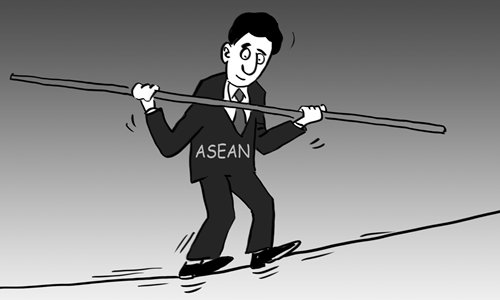The Philippines hosted the 11th ASEAN Defense Ministers' Meeting (ADMM) and the 4th ADMM-Plus on Monday and Tuesday, attended by defense ministers from 10 ASEAN member states and eight dialogue countries including China and the US.
According to analysis of Southeast Asian media, while ASEAN defense ministers focused on regional terrorism, US Defense Secretary James Mattis drew media's attention back to Sino-US rivalry in the region, stressing that the US hopes to build ASEAN countries into a unified front against China. Obviously this is not in line with ASEAN defense ministers' major concern. What's of major concern is the US attempt to drag ASEAN countries into the rivalry among major powers. This is definitely not what ASEAN countries want.
To establish a united front against China in Southeast Asia is nothing new for the US. It can be traced back to the US-dominated Southeast Asia Collective Defense Treaty signed in June 1954 and the Southeast Asia Treaty Organization founded on that basis next year. Behind the united front is still the US' lingering Cold-War mentality and traditional consciousness on geopolitical confrontation.
However, like the fate of the Southeast Asia Treaty Organization, the so-called united front in Southeast Asia is hardly likely to achieve what the US expects.
Firstly, the US and ASEAN countries differ sharply over understanding China. Although China, the US and ASEAN countries are three important forces to support the regional situation, Sino-US relations and Sino-ASEAN relations are at different levels.
China-US relations are the world's most influential bilateral ties. In the Western traditional cognition of politics, the contradiction between China, a developing country, and the United States, an existing power, constitutes the main basis for Washington to map out policy toward China. Its fundamental goal is to maintain US primacy in regional and global affairs and propagate US hegemony.

ASEAN countries may be concerned about China's economic rise and increasing influence in the region, yet they are subject to historical and cultural factors, and to asymmetric development relations. But they maintain an open and inclusive attitude toward China in regional affairs. As China plays an increasingly active role in regional governance, they began to emphasize China's responsible role and gradually lowered their guard.
Second, ASEAN countries won't follow US orders. Only a small number of ASEAN member states would want to engage the US in regional affairs due to their worry about China's influences. More nations are willing to see a dynamic balance between China and US influence in the region. They don't want to take sides in the rivalry between the two major countries or to get involved in power games. These countries advocate ASEAN's centrality in regional affairs to safeguard regional security.
The two scenarios basically prove that Mattis' attempt to unite ASEAN against China would be futile.
The US makes its regional strategy always eyeing its own national interests and primacy in the region, with little, if any, consideration to the demands of ASEAN countries. The majority of ASEAN members, however, worry about the damaging effects on regional security that the confrontation among the major powers would bring. The uncertain policy of the US in the region is also what they are concerned about.
In view of this, ASEAN leaders represented by Philippine President Rodrigo Duterte hope to maintain their independence in regional affairs. They advocate ASEAN's centrality within the regional multilateral framework, drawing up policies toward China and the US in keeping with their own interests and trying hard to grasp the uncertainty brought in by Sino-US rivalry and the changes in the regional situation.
The author is a research fellow at the Charhar Institute and the College of ASEAN Studies at Guangxi University for Nationalities.
Source: Global Times, October 26, 2017.